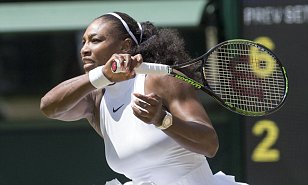It is seven years since Steffi Graf last
graced Centre Court, for the lighthearted
exhibition match that took place to
unveil the Wimbledon roof.
Her presence will be felt again for the
rather more serious business of the
women’s final between Serena Williams
and Angelique Kerber.
Williams will be trying to equal the great
German’s tally of 22 Grand Slams,
something that has turned into a more
torturous process than anyone would
have foreseen in the past year.
The player trying to stop her has been
mentored by Graf who, despite having a
sparing involvement in tennis these
days, has taken a special interest in
Kerber’s career.
The 28-year-old’s visits to the home
Graf shares in Las Vegas with Andre
Agassi have been instrumental in
helping Kerber consolidate her rise up
the rankings and then establish herself
as an elite player after years floating
near the top of the game.
Like many of the best in the men’s
game, Kerber has found there is nothing
quite like being mentored by a former
world No 1 to gain an extra edge. Her
last stay with tennis’s uber couple was
in March.
‘It was the week after Indian Wells,’ she
said. ‘I spent a few days there and I hit
with them both, Andre as well. It is
always an honour.
It’s great to go there and play with
them, talk with them. They are both
champions and also great people, it’s
great they believe in me.’
Kerber knows she has to try to ignore
outside pressures but admitted she has
some extra responsibility after her
country’s Euro 2016 semi-final defeat
by France on Thursday night. ‘It was not
the team’s day,’ she said.
‘They tried everything, but still they
played a good tournament. Of course, I
am in the final now, and I will try to take
the flag for Germany and the hopes.’
Women’s tennis has been desperately
seeking rivalries at the top of the game
in recent years, hindered by the
retirements of Justine Henin, Kim
Clijsters, Li Na and the now tragic figure
of Marion Bartoli.
Kerber is an unlikely challenger to the
younger Williams, but as this is the
second Grand Slam final out of three in
which they have opposed each other,
she can claim to be an authentic threat.
Unlike Maria Sharapova, say, she can
point to a huge recent win — at the
Australian Open — and everyone will be
hoping that this final has the same
drama as seen in Melbourne in
January.
In a way the world No 4 from Bremen
has already done her part by beating
Venus in the semi-final because, for all
the sentimental value, it would not have
been a good look for the women’s game
if a 34-year-old and 36-year-old were
contesting the Wimbledon final.
Anyone who saw Kerber’s second ever
match at Wimbledon in 2008 would be
astonished that she has ended up in the
final. She lost to the late Elena Baltacha
in the first round and looked all at sea
against the former British No 1.
She has steadily improved since,
shoring up her distinctly average serve
in particular, and was well worth her
victory in Australia.
On that night in Melbourne there were
signs of the nervous funk that has
marked Serena in her last three Grand
Slam defeats, by Roberta Vinci, Kerber
and Garbine Muguruza in Paris. You
suspect it will be different at
Wimbledon. Williams is more assured on
the grass, and her serve will have
greater potency on this surface.
Also, there was a hint in Australia that
the American believed she only needed
to play a conservative game within
herself to emerge the winner.
It was not exactly complacency but this
time she knows that she will have to go
out and play her natural aggressive
game if she is to hold the trophy aloft.
And if Williams fails in her mission it will
mean that she is left, at nearly 35,
without a Grand Slam title to her name
so far this season — an unthinkable
proposition 12 months ago.

